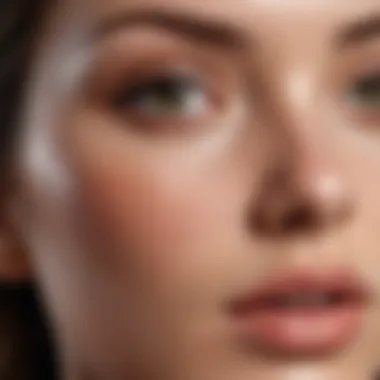Top Makeup Picks for Eczema-Prone Skin: A Guide


Intro
Eczema is a skin condition that can cause a range of symptoms, including dryness, redness, and irritation. For those who experience this, finding suitable makeup can be a challenge. This article delves into effective makeup options tailored for eczema-prone skin. By analyzing essential product characteristics, ingredient safety, and application techniques, we aim to provide valuable insights for individuals looking to enhance their beauty routines while supporting their skin health.
Many people with eczema are cautious about what they apply to their skin. Sensitive skin requires products that minimize irritation and provide effective coverage without exacerbating the condition. Understanding the interplay of skincare and makeup is vital for achieving a balance that respects the needs of the skin while allowing for personal expression through cosmetics. As we explore this topic, we will spotlight key makeup trends, practical beauty tips, and notable product recommendations that align with the unique requirements of eczema-prone skin.
Understanding Eczema
Eczema is a chronic skin condition that can pose significant challenges, especially for those who wish to use makeup. Recognizing its underlying mechanisms enables makeup users to make informed choices, minimizing irritation while enhancing beauty. Understanding eczema not only informs the selection of appropriate products but also assists in tailoring application techniques that promote skin health.
Definition and Types
Eczema, also known as atopic dermatitis, is a condition characterized by inflamed and itchy skin. This inflammation results in red patches, dryness, and sometimes blisters. There are several types of eczema, each with distinct triggers.
- Atopic Dermatitis: This is the most common form, often seen in individuals with a family history of allergies.
- Contact Dermatitis: This occurs when the skin reacts to something in contact, such as makeup or certain materials.
- Seborrheic Dermatitis: Commonly manifests on the scalp and face, leading to dandruff-like flaking.
- Dyshidrotic Eczema: Characterized by small blisters on hands and feet.
Understanding these types ensures that those with eczema choose products carefully, decreasing the risk of flare-ups.
Causes and Triggers
Eczema does not have a single cause; it results from the interplay of genetics and environmental factors. Common triggers include:
- Irritants: Soaps, detergents, and certain fabrics can exacerbate eczema.
- Allergens: Pollen, pet dander, and mold are common allergens that can set off symptoms.
- Changes in Weather: Dry, cold air or excessive heat can worsen skin conditions.
- Stress: Emotional stress is known to correlate with flare-ups of eczema.
Identifying personal triggers plays a pivotal role in managing eczema effectively. It helps users avoid specific products that may worsen their condition, thereby allowing for a more enjoyable application of makeup.
Symptoms and Skin Characteristics
The symptoms of eczema can vary based on the type but generally include:
- Dry, Sensitive Skin: A basic characteristic of eczema is skin that often feels rough and uncomfortable.
- Intense Itching: This can lead to scratching, further exacerbating the condition and causing inflammation.
- Red or Brownish-gray Patches: These are typically found on the hands, feet, ankles, wrists, neck, upper chest, eyelids, inside the bend of the elbows and knees.
- Thickened, Cracked Skin: Chronic scratching may result in skin becoming thick and leathery.
"Eczema can vary from person to person, making individual experiences unique."
Recognizing these symptoms helps individuals approach makeup application with the utmost caution. Selecting the right formulations becomes essential in preventing irritation and discomfort.
In summary, understanding eczema is crucial for anyone with this condition who wants to wear makeup. With a clear grasp of its definitions, causes, and symptoms, users can navigate their choices more wisely, ensuring that they not only look good but also maintain healthy skin.
Challenges of Makeup for Eczema
Makeup can be an essential part of self-expression and personal care; however, for individuals with eczema, it often presents unique challenges. Understanding these challenges is vital for making informed choices about the products used. Eczema-prone skin is delicate and requires special consideration to avoid exacerbating any existing conditions. Choosing makeup that is suitable for sensitive skin can help minimize the chances of irritation and discomfort, making it important to recognize the specific factors that play a role in how makeup interacts with this skin type.
Irritation and Allergic Reactions
Irritation is one of the most common problems faced by those with eczema when applying makeup. Many cosmetics contain ingredients that can trigger allergic reactions, leading to redness, swelling, and increased sensitivity. Understanding your skin and identifying specific triggers is essential before introducing any new products. It is advisable to patch-test all makeup items on a small area of skin, especially around sensitive areas such as the face.
In general, common irritants found in makeup can include alcohol, fragrances, and certain preservatives. Products containing harsh chemicals may strip moisture from the skin, resulting in further irritation. Therefore, choosing products labeled as hypoallergenic and free from harmful additives becomes crucial.
Choosing Non-Comedogenic Products


Non-comedogenic products are formulated to avoid clogging pores, making them an excellent choice for eczema-prone skin. Clogged pores can lead to outbreaks of acne or exacerbate existing skin conditions, thus complicating the care routine for individuals with eczema. When selecting makeup, always refer to labels that specify "non-comedogenic." This ensures that the products work harmoniously with your skin care routine, allowing it to breathe while providing coverage.
It's also beneficial to research ingredient lists thoroughly to avoid components known to cause flare-ups. For example, mineral-based foundations often include lightweight ingredients that provide excellent coverage without the risk of pore blockage. This, in combination with non-comedogenic labeling, significantly reduces the chances of negative reactions.
Accommodating Flare-ups
Living with eczema often means experiencing flare-ups. These unexpected episodes create unique challenges when it comes to makeup application. During flare-ups, the skin may become inflamed, dry, and irritated. It is important to adapt your makeup routine during these moments to ensure comfort and maintain skin health.
During a flare-up, opt for products that offer soothing ingredients, such as aloe or chamomile. These can provide immediate relief and hydration. Additionally, applying makeup lightly and avoiding heavy layers can prevent further irritation. Less is often more. For days when the skin looks particularly uncomfortable, consider using a tinted moisturizer rather than a heavy foundation. This can offer a more breathable layer, reducing stress on the skin.
Essential Makeup Features for Sensitive Skin
Understanding the unique needs of eczema-prone skin is crucial when selecting makeup. Individuals dealing with eczema often experience heightened sensitivity. The makeup products they choose can either alleviate discomfort or exacerbate irritation. Considering this, specific features are essential for makeup tailored to sensitive skin.
Hypoallergenic Formulations
Hypoallergenic formulations are vital for anyone with eczema. Products labeled as hypoallergenic are designed to minimize allergic reactions. These formulations typically exclude common irritants and allergens. This results in fewer potential triggers for sensitive skin. It is important to check the ingredient list. Even products labeled as hypoallergenic may contain substances that some people react to. Ideally, conducting a patch test on a small skin area before widespread application is a good practice. By opting for hypoallergenic makeup, individuals with eczema can reduce the risk of flare-ups and discomfort.
Fragrance-Free Products
Many makeup products contain fragrances that may irritate sensitive skin. Fragrance-free alternatives mitigate the risk of triggering skin reactions. When an individual opts for fragrance-free products, they can trust the formulation is less likely to contribute to inflammation. It is essential to read labels thoroughly. Some products labeled as "unscented" may still contain masking fragrances. Thus, always look for genuinely fragrance-free formulations to be safe. This approach helps ensure that makeup does not contribute to skin challenges.
Moisturizing Ingredients
Makeup that incorporates moisturizing ingredients can be highly beneficial for eczema-prone skin. Ingredients like hyaluronic acid, glycerin, and natural oils can hydrate the skin. Not only does this layer provide comfort during wear, but it also helps maintain the skin barrier. When the skin barrier is healthy, the chances of irritation and flare-ups decrease. Look for foundations or primers that highlight their hydrating properties. Makeup that combines coverage with moisture support can significantly enhance wearability throughout the day.
Mineral Makeup Considerations
Mineral makeup often serves as a suitable option for those with eczema-prone skin. These products usually contain simpler ingredients. They avoid irritants like preservatives, making them a safer choice. Typical components include zinc oxide and titanium dioxide, which can even offer sun protection benefits. When using mineral makeup, however, it's important to select quality brands. Not all mineral products are created equal; some may contain fillers that could irritate the skin. Therefore, do thorough research and prefer well-reviewed brands that adhere to a clean ingredient list.
"Choosing the right makeup can profoundly affect comfort and satisfaction for individuals with eczema."
By focusing on these essential features, individuals with eczema can make informed choices. Understanding which makeup characteristics help soothe and protect sensitive skin is key. Not only does it enhance the overall makeup experience, but it can also directly contribute to healthier skin over time.
Recommended Makeup Products
In the pursuit of beauty and self-expression, makeup can pose significant challenges for those with eczema. Choosing the right products is essential not just for appearance, but also for skin health. Eczema-prone skin requires specialized makeup formulations to reduce irritation and support overall skin condition. This section outlines recommended makeup products tailored to facilitate comfort, protection, and enhancement for sensitive skin.
Foundations for Eczema-Prone Skin
When selecting a foundation, look for options that cater specifically to sensitive skin. Non-comedogenic, lightweight products are highly beneficial as they allow skin breathability without clogging pores. Mineral foundations often stand out in this regard, as they typically use natural ingredients like zinc oxide and titanium dioxide. These components not only help provide coverage but also reinforce barrier function, minimizing the risk of exacerbating eczema.
Dramatized coverage is not always necessary, especially when the goal is to achieve a natural look. Opt for liquid formulations that offer buildable coverage. Brands like Alima Pure and BareMinerals predominantly provide these options which balance coverage with gentleness on the skin.
Concealers and Correctors
Correcting uneven skin tone or managing redness can be easily achieved with an appropriate concealer. It is crucial to choose products that align with the skin's requirements for moisture and can seamlessly integrate with the foundation. Look for creamy formulations that glide on effortlessly.
Brands such as RMS Beauty and Tarte provide concealers that not only camouflage blemishes but also contain hydrating ingredients. This dual function ensures that while you correct skin imperfections, you also nourish your skin at the same time. Remember that a little product can go a long way; therefore, apply thin layers and build gradually to avoid heavy buildup.
Blushes and Bronzers


Color is essential in enhancing the complexion, especially for肤色的 and tired skin. However, traditional formulas often contain harsh chemicals that can withdraw moisture and irritate sensitive skin. Choosing cream-based blushes or bronzers is recommended as they adhere well and offer a more natural finish.
Brands like Ilia and Axiology feature products focused on natural ingredients, thus reducing the likelihood of triggering flare-ups. Always opt for shades that promote a natural flush. Utilize finger application to ensure warmth from the skin adds to the final finish, as it can prevent further irritation.
Eye Makeup Options
Eyescan be extremely sensitive, especially for those with eczema. Therefore, it is necessary to choose eyeshadows and eyeliners formulated with hypoallergenic ingredients. Cream or gel-based eyeshadows not only apply with ease but often contain conditioning agents that keep lids hydrated. Brands like Jane Iredale offer wide ranges of eye products that cater to sensitive skin, ensuring that makeup is also nourishing.
Be cautious with mascara as well; opting for brands like Fenty Beauty can result in both enhanced lash appearance without compromising comfort. Look for products labeled as hypoallergenic or dermatologist tested to further ensure safety.
Lip Products That Sooth and Protect
Lips are often the first area to display signs of dryness, particularly in individuals with eczema. Selecting lip products that incorporate hydrating and soothing ingredients such as shea butter, coconut oil, and aloe vera is vital. Brands like Burt's Bees excel in this area, offering lip balms and tinted products that moisturize while providing a hint of color.
Additionally, it is important to avoid highly pigmented lipsticks with deep formulas as they may contain irritating components. Staying with lip stains or tinted balms ensures comfort without compromising aesthetics. Regular reapplication may be necessary for maintaining hydration.
"Using the right makeup products can transform the experience of wearing cosmetics for those with eczema."
Application Techniques
Understanding proper application techniques is crucial for individuals with eczema-prone skin. The way makeup is applied can significantly affect both the appearance of the skin and the comfort of the wearer. By utilizing techniques that emphasize gentleness, layering, and appropriate tools, users can minimize irritation and enhance the overall effectiveness of their makeup routine.
Prepping the Skin
Prepping the skin is an essential step before applying any makeup. This involves cleansing, moisturizing, and protecting the skin. For eczema-prone skin, it is vital to use a gentle, fragrance-free cleanser to avoid further irritation. After cleansing, opt for a rich moisturizer that contains ingredients such as ceramides or hyaluronic acid. These help lock in moisture and create a smooth canvas for makeup application. Using a barrier cream can also be beneficial as it provides an additional layer of protection against makeup and environmental irritants.
- Cleanse with a gentle product.
- Apply a rich moisturizer.
- Consider a barrier cream if necessary.
Layering Makeup for Comfort
Layering makeup correctly is essential for ensuring both comfort and coverage. Start with a thin layer of foundation or tinted moisturizer, allowing it to settle before adding more product. This not only provides a more natural look but also reduces the risk of caking, which can lead to discomfort on sensitive skin. Between layers, allow time for each product to absorb. If using concealer, apply it sparingly and blend thoroughly to avoid a heavy appearance.
Tip: Choosing makeup products with lighter textures can help maintain comfort throughout the day.
Tools to Minimize Irritation
Using the right tools during application can significantly reduce the risk of irritation. Consider using makeup brushes or sponges that are specifically designed for sensitive skin. Look for brushes that are soft and dense, as these can provide an even application without tugging or pulling at the skin. It is also important to regularly clean brushes and sponges to avoid the accumulation of bacteria, which can cause breakouts or irritation.
- Use soft brushes.
- Clean tools regularly.
- Avoid any harsh application techniques that might damage the skin.
Implementing these application techniques can dramatically enhance the makeup experience for those with eczema-prone skin. By focusing on preparation, layering, and the right tools, it is possible to achieve a beautiful finish while prioritizing skin health.
Post-Makeup Skin Care
Post-makeup skin care is an integral part of managing eczema-prone skin. Applying makeup can alter the skin's moisture balance and sometimes lead to irritation. Thus, it is crucial to establish a routine for post-makeup care. Not only can it help remove makeup residue, but it also aids in preventing flare-ups. A proper regimen can support skin health and enhance overall comfort.
Removing Makeup Effectively
Effective makeup removal is vital for those with eczema. Many products, especially water-resistant ones, can cling to the skin. This residue can cause irritation and aggravate existing conditions. Choosing a gentle makeup remover is essential. Look for products that are fragrance-free and include soothing ingredients like aloe vera or chamomile.
- Oil-based removers can break down heavy makeup gently.
- Micellar water is another excellent option, as it effectively cleans the skin without stripping moisture.
- Cream cleansers can also be beneficial. They often provide hydration while cleansing the skin.


In addition to using the right product, the method of removal matters. Use a soft cloth or cotton pad, applying a light pressure. Avoid harsh scrubbing as it can irritate the skin. Always rinse with lukewarm water afterward to ensure all residue is gone.
"Gentle cleansing leads to healthier skin, especially for those with sensitive conditions like eczema."
Nourishing the Skin After Makeup
After removing makeup, it's essential to nourish the skin. Eczema-prone skin often needs extra hydration. Apply a moisturizing lotion or cream that is specifically for sensitive skin. Look for products with ingredients such as ceramides or hyaluronic acid, as they can restore the skin barrier.
- Hydrating serums can provide additional moisture and support.
- Fragrance-free emollient ointments can be applied to areas that feel particularly dry.
- Sunscreen is important as well, especially for daytime wear. Choose a mineral-based formula to avoid irritation.
Give your skin time to absorb the products. This will help retain moisture overnight and minimize the risk of flare-ups. Pay attention to how your skin reacts, and adjust your routine accordingly. For individuals with eczema, every step counts, so establishing an effective post-makeup care routine can significantly enhance skin health.
Living with Eczema and Makeup
Navigating the world of makeup with eczema can be challenging and frustrating. The delicate nature of eczema-prone skin requires a thoughtful approach to beauty routines. Understanding the implications and strategies for makeup application is crucial. This section discusses how to adapt to skin changes and effectively communicate with makeup brands, ensuring a satisfactory experience.
Adjusting to Changes in the Skin
Eczema can cause fluctuations in skin texture, moisture levels, and sensitivity. As these changes occur, adjustments to makeup routines become necessary. Recognizing these shifts enables better choices in products and application methods. For example, during flare-ups, skin may feel drier or more sensitive, making heavy foundations uncomfortable. In such cases, opting for lightweight, hydrating formulas can offer relief while maintaining coverage.
Key adjustments include:
- Choosing lighter foundations: Formulas that offer hydration without heaviness are ideal. Products like BB creams can offer a good balance between coverage and comfort.
- Prioritizing moisturizing primers: A moisturizing base can soothe skin and improve makeup adherence.
- Monitoring skin reactions: Keeping an eye on any product that causes irritation is essential. If a product triggers a reaction, discontinuing its use is prudent.
By staying attentive to how skin responds, makeup users with eczema can craft a routine that complements their skin rather than exacerbates it.
Communicating with Makeup Brands
Effective communication with makeup brands is key for individuals with eczema. As consumers, it is important to inquire about the specific ingredients used in products. Many brands have customer service teams ready to address queries about eczema-friendly options.
When reaching out to brands, here are a few points to consider:
- Ingredient inquiries: Ask about hypoallergenic and irritant-free ingredients. Brands should be transparent about what is included in their products.
- Product testing: Inquire whether products are tested on sensitive skin or formulated in consultation with dermatologists. This information can help establish trust.
- Testimonials and reviews: Look for feedback from others with eczema. Understanding their experiences with specific products can guide choices.
Communication not only helps in understanding product suitability but can also drive brands to innovate for sensitive consumers.
Embracing an open dialogue with makeup brands ultimately supports a more tailored beauty experience, enabling users to wear makeup without compromising skin health.
Epilogue
In this article, we explored the best makeup options suited for eczema-prone skin. Understanding the unique challenges faced by individuals with eczema goes beyond mere product selection. It intersects with skin health, comfort, and self-esteem.
Makeup can be both a means of expression and a source of confidence. However, for those with eczema, the choice of products must often be navigated with meticulous care. By focusing on hypoallergenic, fragrance-free, and non-comedogenic makeup, individuals can better manage potential flare-ups and irritation.
Benefits of Understanding Makeup Choices
The benefits of informed product choices include:
- Reduced Irritation: Selecting suitable products minimizes the risk of allergic reactions and discomfort.
- Enhanced Skin Condition: Makeup with nourishing ingredients supports skin health, rather than detracting from it.
- Increased Confidence: The right makeup options allow individuals to feel good in their own skin, enhancing their overall mood.
Considerations for Eczema-Prone Skin
When approaching makeup for sensitive skin, consider the following:
- Testing New Products: Always conduct a patch test to ensure compatibility with your skin.
- Consulting Dermatologists: Professional advice can help filter out potentially harmful products and provide tailored recommendations.
- Paying Attention to Ingredients: Ingredients like sodium hyaluronate or ceramides can significantly benefit skin hydration and barrier repair.
Ultimately, choosing the right makeup is not just about covering up imperfections; it's about enhancing one's natural beauty while respecting the boundaries set by eczema. A thoughtful makeup regimen can yield substantial benefits, transforming the user experience into one of empowerment rather than frustration. As such, staying informed and cautious will lead to better management of eczema, allowing individuals the freedom to enjoy makeup without compromise.



